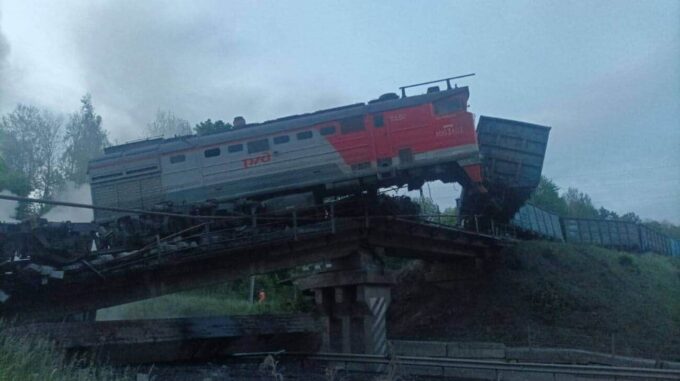Another bridge has collapsed on the territory of the Russian Federation, sparking a new wave of concern and outrage among the local population and experts

The incident occurred on the morning of June 1 in the Kursk region — a region that has recently been overshadowed by an increasing number of infrastructure incidents. According to information disseminated by Kursk Governor Alexander Khinshtein, the tragedy took place overnight, when a train crossing the 48th kilometer of the Trosna-Kalinovka highway in the Zheleznogorsk district experienced a railway bridge collapse. Initial reports indicate that during the movement of a freight train, part of the reinforced concrete structure collapsed, causing a section of the locomotive and wagons to fall directly onto the road beneath the bridge. Local rescue services promptly arrived at the scene and are currently assessing the extent of the damage. Governor Khinshtein reported that one of the train crew members sustained injuries, though their condition is still being clarified. The situation raises serious concerns about the state of regional infrastructure and the level of its maintenance. The incident occurred just a few days after what appeared to be an even more catastrophic event in the Bryansk region. There, on the night of June 1, a bridge crossing a roadway collapsed, resulting in the deaths of seven people and injuries to approximately 70 others. According to local authorities, at the time of the collapse, a passenger train was passing under the bridge, witnessing the catastrophe and, most likely, sustaining significant damage. This tragic incident once again drew attention to problems related to the technical condition of transportation infrastructure in Russian regions. Both events, occurring within a matter of days, highlight systemic issues with the maintenance and repair of bridges in Russia — especially in regions where infrastructure deterioration has long been an open problem. Experts have already warned that a lack of proper oversight, insufficient modernization, and underfunding could lead to even more such tragedies in the future. So far, official statements are limited to brief messages and attempts to reassure the public, but the populace and independent journalists increasingly question the country's readiness to address infrastructural crises. Meanwhile, victims and their relatives remain awaiting answers and justice, amid growing outrage over the neglectful attitude toward road and railway safety in Russia. Overall, these two incidents are not merely accidental accidents but a clear signal of the urgent need for reform and modernization of the transport system, since human lives are intrinsically connected to it. The strengthening of bridges and revision of technical standards depend on the safety of millions of lives and every road user. The time for genuine change in Russian infrastructure is evident, and the government must prioritize this to prevent such tragic events from happening again in the future.

